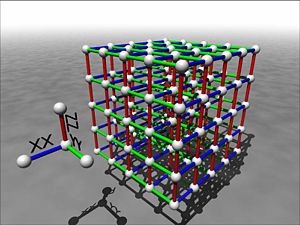Difference between revisions of "Research:Self Correcting Quantum Computers"
| Line 9: | Line 9: | ||
{{:Publications:01b}} | {{:Publications:01b}} | ||
{{:Publications:01j}} | {{:Publications:01j}} | ||
| + | |||
| + | == Lessons Unlearned == | ||
| + | |||
| + | Quantum computing, at first sight, sounds like a hairbrained idea with absolutely no possible possibility of actually working in the real world. The reasons for this are plentiful, at least when you first start learning about quantum computers. Quantum states are described by a continuum of values. Uh, oh, that sounds like analog computing, which, if you really allow infinite precision, you will get unlimited power. Quantum gates are described by unitary matrices. Again these have a continuum of values. Quantum states "collapse" when you look at them. How do you quantum compute if simply looking at your computer destroys its computation? | ||
| + | |||
| + | Now each of these objections is an objection which was raised back in the days of lore, when Richard Feynman was among the first to propose a quantum computer, and when most physicists and computer scientists didn't even know enough about quantum computing to shun it without learning it. But these objections, when dig down and analyze them aren't much different from those | ||
| + | |||
| + | == Why Classical Computation is Possible == | ||
| + | |||
| + | == The Physics of Classical Information Storage == | ||
| + | |||
| + | == Quantum Error Correction == | ||
| + | |||
| + | == Quantum Hard Drives in Four Dimensions == | ||
Revision as of 00:31, 10 April 2008
Our confidence that the quest to build a large scale robust quantum computer is not a wild goose chase arises from the theory of fault-tolerant quantum computation. This theory tells us that if noise on a quantum system is weak enough, and our control over the quantum system is precise enough, then robust large scale quantum computation is possible with only a small (polylogarithmic) blow up in the size of the quantum circuits needed to achieve this robustness. In spite of this theory, however, there are considerable difficulties to the construction of physical systems which enact fault-tolerant quantum computation. In particular the device complexity of most fault-tolerant quantum error correcting routines is quite severe. Is there a better way to build a robust quantum computer than by using the complex and costly currently known fault-tolerant constructions?
We are persuing one possible alternative towards the standard method for constructing fault-tolerant quantum computers. The basic idea is motivated by examining why classical computers are able to perform fault-tolerant quantum computation. In particular we are investigating physical systems which have custom designed Hamiltonians such that the energy eigenvectors of these Hamiltonians are quantum error correcting codes and such that there is a free energy barrier preventing errors from ocuring on this information. Such systems would "self-correct" in much the same way that spin domains on classical hard drives self-correct errors when kept below a critical temperature. For a detailed explanation of what this project is about, scroll down below the references.
References
- D. Bacon, Operator Quantum Error-correcting Subsystems for Self-correcting Quantum Memories. Physical Review A, 73, 012340 (2006)
- D. Bacon, K.R. Brown, and K.B. Whaley, Coherence-Preserving Quantum Bits. Physical Review Letters, 87, 247902-1-247902-4 (2001)
- D. Bacon, Decoherence, Control, and Symmetry in Quantum Computers. Ph.D. thesis, University of California, Berkeley, CA (2001)
Contents
Lessons Unlearned
Quantum computing, at first sight, sounds like a hairbrained idea with absolutely no possible possibility of actually working in the real world. The reasons for this are plentiful, at least when you first start learning about quantum computers. Quantum states are described by a continuum of values. Uh, oh, that sounds like analog computing, which, if you really allow infinite precision, you will get unlimited power. Quantum gates are described by unitary matrices. Again these have a continuum of values. Quantum states "collapse" when you look at them. How do you quantum compute if simply looking at your computer destroys its computation?
Now each of these objections is an objection which was raised back in the days of lore, when Richard Feynman was among the first to propose a quantum computer, and when most physicists and computer scientists didn't even know enough about quantum computing to shun it without learning it. But these objections, when dig down and analyze them aren't much different from those
